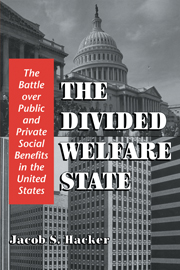Book contents
Part II - The Politics of Public and Private Pensions
Published online by Cambridge University Press: 05 June 2012
Summary
[Private pension plans] have grown to the point of where they have become a form of social insurance, if you will, in the United States of America. The labor movement would have preferred … some other approach to these matters, but this is what has grown up in our society. We would have preferred…some outright Government insurance where everything would have been aboveboard and where people could have seen it. That has gone by the board at least for the moment, and we are now operating under these health and welfare and pension plans.
– Andrew Biemiller, Director, Department of Legislation, AFL-CIO, Hearings Before House Committee on Education and Labor, 1957Congressman Dent: Well, we have to deal with what we have. … We have a private pension system in the United States which has accumulated a huge sum of money in reserve. There are many contracts that are consummated between employer and employee. What do we do about it now? … Do we give assurance to the employee when he reaches retirement age he will have a stipulated sum of money, or do we eliminate the private pension system altogether?
Nelson McClung, the Urban Institute: I don't think you have the second option. What you are doing is right and good. I guess I am complaining that this second option should be available but it is not. I think it is unfortunate that we let ourselves get into this box. […]
- Type
- Chapter
- Information
- The Divided Welfare StateThe Battle over Public and Private Social Benefits in the United States, pp. 67 - 70Publisher: Cambridge University PressPrint publication year: 2002

